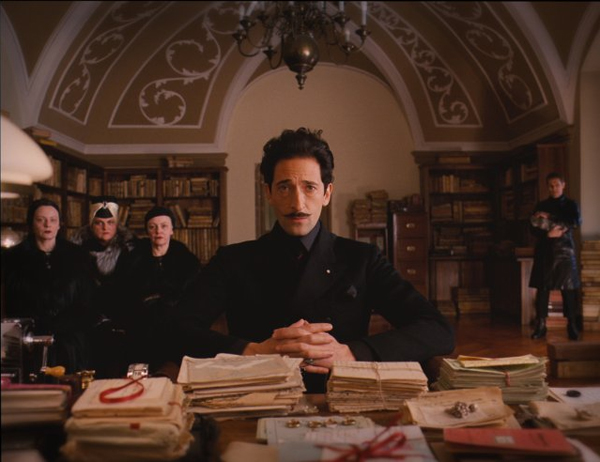
Wes Anderson is arguably the most individually distinctive film director living today. His films are meticulously crafted on every level, from the script to the set design to the soundtrack to the cinematography and so on, so much so that any single frame taken from any of his movies would be enough to give that film’s director away. With each film he makes, not only does the inherent Wes Anderson-ness of each increase, so too does the quality.
The Grand Budapest Hotel is billed as a comedy, probably because it has more laugh-out-loud moments (uncharacteristically bawdy ones at that) than many of the director’s previous works, but the film runs the gamut of genres. The framework of The Grand Budapest Hotel is that of a Russian nesting doll, inside of which is the tale of the titular hotel’s concierge, Gustave H (Fiennes giving one of his “fiennest” performances), and his devoted lobby boy, Zero Moustafa (the excellent Tony Revolori).
Gustave’s “Rushmore” is working at and for the hotel, and he does so with enough gusto and panache for the entire staff, all the while keeping company with the myriad elderly, rich madams who frequent the fictional mountaintop vacation spot. When one of these lovers bequeaths a priceless Victorian painting entitled Boy with Apple (fictional of course) to Gustave, he and his lobby boy must evade and elude the deceased woman’s cartoonishly villainous cadre of relatives, led by a mustache-twirling Adrien Brody and a beastly Willem Dafoe, in yet another unforgettable Anderson role. Meanwhile, this cat-and-mouse-capade takes place during a violent political shift in the imaginary Eastern European country of Zubrowka, with an SS analog called the ZZ, captained by Edward Norton.
There are too many big stars to name here, but along with Fiennes’ paradoxically prim-and-proper, poetry-reciting, potty-mouthed fop, the set design deserves top billing, with exquisite miniatures serving as both exterior location shots and anachronistic big action set pieces. Wes Anderson can be too precious for some, but The Grand Budapest Hotel feels like his most adult work to date. As his films continue to be purer distillations of his fantastical whims, counterintuitively their grasp on real world themes becomes more concrete. Like the intricate, flowery Mendl’s cakes in the film, The Grand Budapest Hotel is a thing of beauty masking a harsher reality.












